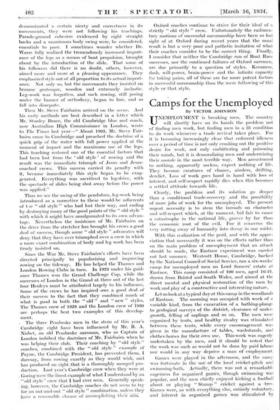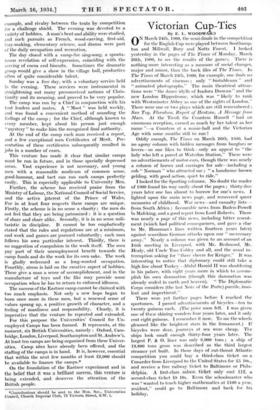Camps for the Unemployed
By VICTOR JOHNSON
UNEMPLOYMENT is breaking men. The country will shortly have on its hands the problem not of finding men work, but finding men in a fit condition to do work whenever a trade revival takes place. For it is becoming increasingly clear that enforced idleness over a period of time is not only crushing out the positive desire for work, not only embittering and poisoning their minds, but it is demoralizing men and undermining their morale in the most terrible way. Men accustomed to nothing, apparently useless, expect nothing of life. They become creatures of chance, aimless, drifting, derelict. Loss of work goes hand in hand with loss of interest, and self-respect rapidly dies when this becomes a settled attitude towards life. .
Clearly, the problem and its solution go deeper than a conditional trade-recovery and the possibility of more jobs of work for the unemployed. The present urgent necessity is to stern the inroads on character and self-respect which, at the moment, bid fair to cause a catastrophe in the national life, graver by far than the economic root of the evil. For. it concerns the very rotting away of humanity into decay in our midst.
With this realization of the peril, and with the appre- ciation that necessarily it was on the effects rather than -on the main problem of unemployment that an attack should be made, the Eastnor experiment was carried out last summer. Westeott House, Cambridge, backed by the National Council of Social Service, ran a six-weeks' camp for unemployed men on Lord Somers' estate at Eastnor. This camp consisted of 100 men, aged 16-21. drawn from Bristol and South Wales, and aimed at the direct mental and physical restoration of the men by work and play of a constructive and interesting nature.
• Let us look at a typical day at this camp in the woodlands of Eastnor. The morning was occupied with work of a variable kind, from the excavation of a bathing-plunge to geological surveys of the district, -clearance of under- growth, felling of saplings and so on. The men were organized by tents, and healthy rivalry was stimulated between these tents, while every -encouragement was given in the manufacture of tables, washstands, and clothes. horses for their. own use. This work was eagerly undertaken by the men, and it should be noted that the work was such as would not -he done by paid labour 'nor would in any way deprive a man of. employment.
Games were played in the afternoon, and the camp was fortunate in the use' of' the local cricket-pitch and swimming-bath. Attirally, there was not a remarkable eagerness for organized garn6s, though swimming was popUlar, and the men chiefly enjoyed kicking a football about or playing " Stump " cricket against a -tree. Games were, as with everything else, entirely voluntary, and interest in organized gaines was stimulated by example, and rivalry between the tents by competition for a challenge shield. The evening was devoted to a variety of hobbies. A man's bent and ability were studied, and such pursuits as. French, wood-carving, first-aid, tray-making, elementary science, and drama were part of the daily occupation and recreation.
The day closed with a camp-fire sing-song, a sponta- neous revelation of self-expression, coinciding with the serving of cocoa and biscuits. Sometimes the dramatic group would give a show in the village hall, productive often of quite considerable talent.
Sunday was a free day, with a voluntary service held in the• evening. These services were instrumental in straightening out many preconceived notions of Chris- tianity and its meaning, and proved to be very popular. The camp was run by a Chief in conjunction with his tent leaders and mates. A " Moot " was held weekly, and was found a convenient method of sounding the feelings of the camp ; for the Chief, although known to every member, kept about his person just enough " mystery " to make him the recognized final authority.
At the end of the camp each man received a report, and a few exceptional men Certificates of Merit. Pre- sentation of these certificates subsequently resulted in jobs in a number of cases.
This venture has made it clear that similar camps must be run in future, and in those specially depressed areas. Vast experience is not necessary, and young men with a reasonable modicum of common sense, good-humour, and tact can run such camps perfectly easily. This is especially applicable to University Men.
Further, the scheme has received praise from the Ministry of Labour, the National Council of Social Service, and the active interest of the Prince of Wales.
For in at least four respects these camps are unique. Firstly, the scheme is in no sense a charity; the men do not feel that they are being patronized : it is a question of share and share alike. Secondly, it is in no sense mili- taristic in discipline. It cannot be too emphatically stated that the rules and regulations are at a minimum, and work and games are pursued voluntarily; each man follows his own particular interest. Thirdly, there is no suggestion of compulsion in the work itself. The men pay part of their unemployment benefit towards the camp funds and do the work for its own sake. The work is gladly welcomed as a long-wanted occupation. Fourthly, stress is laid on the creative aspect of hobbies. These give a man a sense of accomplishment, and in the manufacture of toys and the like may provide some occupation when he has' to return to enforced idleness.
The success of the Eastnor camp cannot be claimed with too much emphasis. Not only a new hope began to burn once more in these men, but a renewed sense of values sprang up, a positive growth of character, and a feeling of manliness and responsibility. Clearly, it is imperative that the venture be repeated and extended.
For this purpose the Universities' Council for Un- employed Camps has been formed. It represents, at the moment, six British Universities, namely : Oxford, Cam- bridge, London, Liverpool, Southampton and St. Andrew's. At least ten camps are being organized from these Univer- sities. Camp sites have already been offered, and the staffing of the camps is in hand. It is, however, essential that within the next few months at least £2,000 should be available to finance the camps.* On the foundation of the Eastnor experiment and in the belief that it was a brilliant success, this venture is being extended, and - deserves the attention of the British people.
*Contributions should be sent to the Hon. Sec., Universities Council, Church Imperial Club, 75 Victoria Street, S.W. 1.











































 Previous page
Previous page